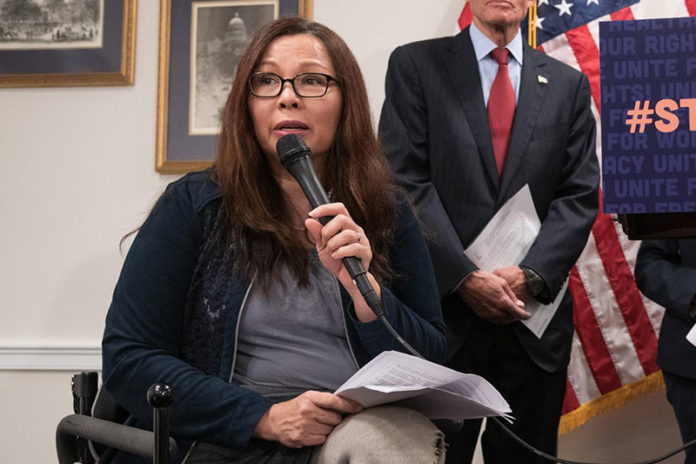Born in Thailand to an American father and serving the state of Illinois, Democrat Senator Tammy Duckworth is not only the first Asian American to be elected from Illinois, she is the first woman with a disability to be elected to Congress.
Duckworth served in the Army and was deployed in Iraq. As a helicopter pilot, she lost both of her legs and has limited use of her right arm when the Black Hawk she was co-piloting was hit by an RPG in 2004.
While Duckworth has been critical of President Trump in the past, referring to him as “Cadet Bone Spurs” the recent decision by the Supreme Court to uphold Trump’s ban of transsexuals in the military had the Senator running for the presses.
Basing her reasoning on the injuries Duckworth received in the war, the Senator posted to Twitter:
When I was bleeding to death in my Black Hawk helicopter on that dusty field in Iraq, I didn’t care if the American troops risking their lives to help save me were gay, straight, transgender, black, white, male or female. All that mattered was they didn’t leave me behind. https://t.co/dsQhwW805o
— Tammy Duckworth (@SenDuckworth) January 22, 2019
The comment is a throw away reference designed to ignore the real issue of transgendered men and women serving in the military.
In 2016, the RAND Corporation conducted study on the impact of “Transgender Personnel on Readiness and Health Care Costs.”
The study estimated the impact to be small, based on the very small population of Americans who fall in the category but their published numbers tell a very different story.
As of the study, it was estimated 1,320 to 6,630 members of the military were transgendered — .51% of the military population.
While LGBTQ advocates estimate that .6% of the American population self-identify as transgendered, the long-standing number of Americans actually diagnosed as what is now considered “gender dysphoria” is only .06% of the population.
RAND’s study, if accurate proves that the military’s funding for health care costs related to gender transitioning is leading to the recruitment of transgenders.
RAND did estimate that the small number of trans in the military would increase health care costs by $2.4 million to $8.4 million. The number represents a cost of $60,000 per transgendered member of the military that chooses to undergo hormone therapy or sex reassignment surgery.
It is rare for a typical member of the military to rack up $60,000 in healthcare costs outside of combat-sustained injuries.
RAND’s study makes no mention to morale or mental health concerns if the policy were to stay in place.
Until 2013, the mental health community defined transgenders as having “Gender Identity Disorder” making the condition an official mental disorder.
Today, the condition is referred to as “Gender Dysphoria” which is the stress and anxiety caused by their “incorrect” sexual assignment at birth.
Those with Gender Dysphoria suffer from depression, anxiety and 41% attempt suicide in contrast to 1.6% of the general population.
It’s argued by many opposed to transgenders in the military that by allowing them to serve, the military would be allowing the service of individuals with known mental disorders.
Today, a number of conditions disqualify recruits from joining the military, ranging from Irritable Bowel Syndrome and hemorrhoids to some dental implant and diabetes. Disqualifications for mental disorders includes anxiety and dissociative disorders.
Senator Duckworth failed to look at the many factors and reasons why transgendered Americans can be disqualified for service, the first being that due to their mental disorder, there would be no guarantee that a trans member of the military would be there to save her as there’s a high probability that anxiety, suicidal tendencies or transition-related health care would prevent their deployment.
Comment below.




























